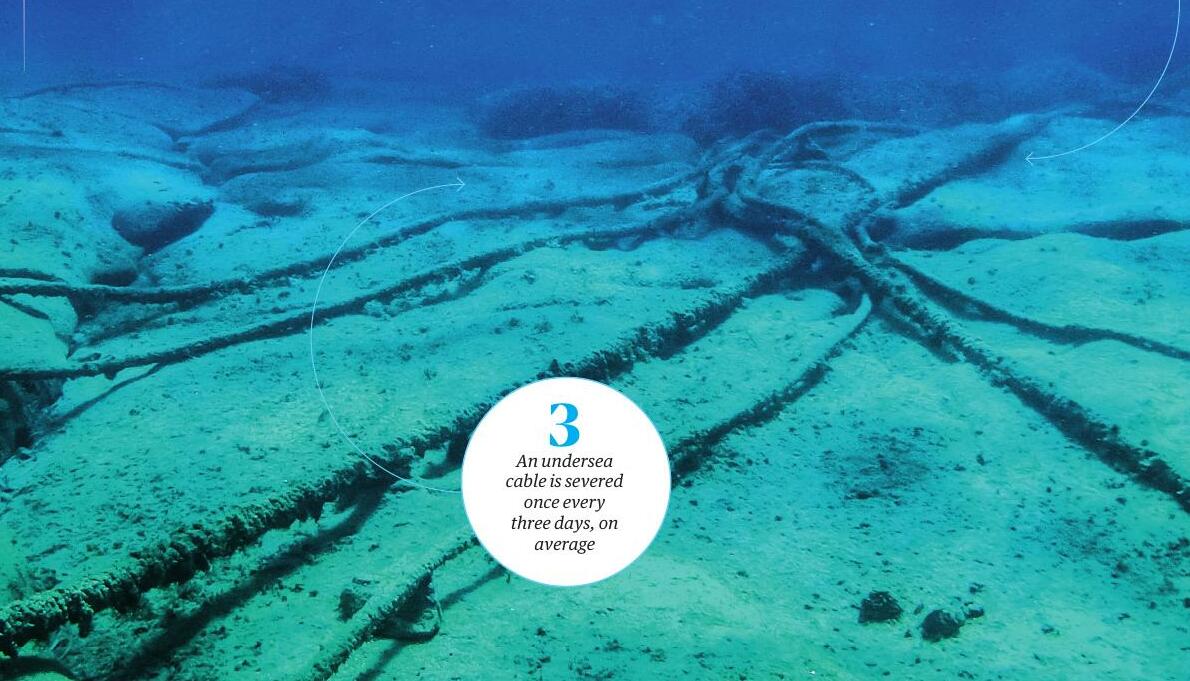
It was the opening days of 2022, in the aftermath of a huge volcanic eruption, when Tonga went dark. The underwater eruption - 1,000 times more powerful than the bomb that was dropped on Hiroshima - sent tsunami waves across Tonga's nearby archipelago and blanketed the island's white coral sands in ash.
The strength of the eruption severed internet connectivity with Tonga causing a communication blackout.
When the undersea cable that provides the country's internet was restored weeks later, the scale of the disruption was clear. The lack of connectivity had hampered recovery efforts while devastating businesses and local finances, many of which depend on remittances from abroad. The disaster exposed the extreme vulnerabilities of the infrastructure that underpins the workings of the internet.
Contemporary life is inseparable from an operational internet, said Nicole Starosielski, a professor at the University of California, Berkeley and the author of The Undersea Network.
It is much like drinking water - a utility that underpins our existence, but few people understand what it takes for it to travel from a reservoir to our taps. Consumers have come to imagine the internet as something unseen in the atmosphere - an invisible "cloud" raining data on us. Because our devices aren't tethered to any cables, many of us believe the whole thing is wireless, Starosielski said. The reality is far more extraordinary.
Almost all internet traffic-including Zoom calls, movie streams, emails and social media feeds - reaches us via high-speed fibre optics laid on the ocean floor. These are the veins of the modern world, stretching almost 1.5 million km under the sea.
Speaking via WhatsApp, Starosielski explained that the data transmitting her voice travelled from her mobile phone to a nearby phone mast. "That's basically the only wireless hop in the entire system," she said.
This story is from the {{IssueName}} edition of {{MagazineName}}.
Start your 7-day Magzter GOLD free trial to access thousands of curated premium stories, and 9,000+ magazines and newspapers.
Already a subscriber ? Sign In
This story is from the {{IssueName}} edition of {{MagazineName}}.
Start your 7-day Magzter GOLD free trial to access thousands of curated premium stories, and 9,000+ magazines and newspapers.
Already a subscriber? Sign In

If kids get protected from online harm, how about the rest of us?
The Australian government has proposed a ban on social media for all citizens under 16.

'It's not drought - it's looting'
Spain is increasingly either parched or flooded - and one group is profiting from these extremes: the thirsty multinational companies forcing angry citizens to pay for water in bottles.

Life in the grey Zone
Neonatal care has advanced so far that babies born as early as 21 weeks have survived. But is this type of care always the right thing to do?

Out of tune? Band Aid under fire for Africa tropes as it turns 40
Forty years ago this month, a group of pop stars gathered at a west London studio to record a single that would raise millions, inspire further starry projects, and ultimately change charity fundraising in the UK.

Deaths shine spotlight on risks of drinking on party trail
Vang Vieng is an unlikely party hub. Surrounded by striking limestone mountains and caves in central Laos, it morphed from a small farming town to a hedonistic tourist destination in the early 2000s.

Different strokes My strange and emotional week with an AI pet
Moflin can develop a personality and build a rapport with its owner - and doesn't need food or exercise. But is it comforting or alienating?

Strike zone Waking up to the rising threat of lightning
When the Barbados National Archives, home to one of the world's most significant collections of documents from the transatlantic slave trade, reported in June that it had been struck by lightning, it received sympathy and offers of support locally and internationally.

Cheap pints and sticky carpets: the old-school pub is back
In the Palm Tree pub, east London, barman Alf is taking only cash at the rattling 1960s till.

Brain gain Can a radical tax scheme convince the country's brightest to stay?
In the autumn of 2018, I moved to Lisbon for a month-long course at the Universidade .de Lisboa.

Fear and sympathy in small town divided over asylum camp
A year after anti-immigration riots, a site for asylum seekers faces hostility while some locals try to help new arrivals